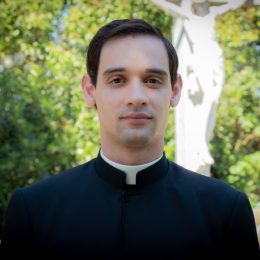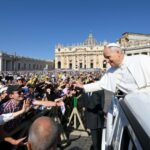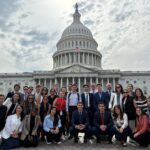The Path to Discovery
I was seventeen years old and about to finish school. Ahead of me, the opportunity to fulfill what I had always wanted: to become a computer engineer. University studies would begin in February of the following year, so I had some time before starting them. The decision was made: I would spend some time in Toronto, Canada, to continue perfecting my English. I would go alone. This is the beginning, the first chimes, of a call that would change my life.
I was born in Valencia, Venezuela, and had lived almost my entire life until then in Barquisimeto, in a small but close-knit family: my dad, my mom, and my sister. A family that shaped me and taught me Christian values and how to be a good person. Their examples of work and dedication, companionship and support are very present in my heart. With them, I never lacked anything and, moreover, they allowed me to live many opportunities and experiences. That’s why at the start of this call, they are with me, because, although I heard God’s voice much more clearly after finishing school, there was already an emerging willingness to be attentive to this call, and I owe it to them. And as I always say, today I am the man I am thanks to them.
Although I studied at a Catholic school—where some priests (mostly elderly) offered us the sacrament of confession a few times a year, and Masses occasionally—there was no vibrant faith life at school. Only the typical catechism class for confirmation and religion classes. In one way or another, we felt it was part of our ordinary life and didn’t raise many “objections.” We could say we were 21st-century Catholics or “light” Catholics, those who call themselves believers but don’t practice much, except for the rosary or a chain around the neck and participating in the procession on January 14 in our city. I didn’t realize then how distant that was from a living faith, of course.
My friends were the best, and yes, our environment was that of normal guys: we went to parties and drank—many times, even too much; we talked about the things normal young people talk about, had the same concerns, got annoyed with classes like anyone else, shared daily life with simplicity, understood each other well, and had great times together, busy with our social lives, in other words, wanting to have fun. But there was something missing in those years, although I realized it later.
Canada, the New World
By the last semester of high school, it was time to decide what we would do: graduation party or graduation trip. We chose the party, and I would go on a trip, but not with my classmates. So, I had to start thinking about what I wanted the trip to be. My parents and I decided that the best would be to complement my English training, so I chose to go to Canada, but not for a whole year, because university started in March of the following year, just for a semester. We chose the school and began preparing all the paperwork. And there I went. I arrived in Toronto at 17 years old and completely alone. I didn’t know what awaited me, and my first surprise was upon arriving at the house where I would stay. Now, don’t get me wrong: first impressions are not always objective, but they do leave a mark.
When I arrived at the house, I rang the doorbell—I was still half asleep, having left Caracas at midnight, a turbulent trip due to hurricane season, and after nearly seven hours, I had landed in Toronto—, I rang the doorbell, and the door opened. A man taller than me, thin, with shaved hair, completely pale skin, and electric blue eyes that startled me, greeted me. But what caught my attention most was his nose piercing. I had never seen a man with a nose piercing before. Seeing it, I felt intimidated, and the first thing I thought was, “Where did I get myself into?” But as I said, first impressions are not always the most objective. I am very grateful to this family, and I wouldn’t have liked to spend this time anywhere else. Despite their eccentricities and their closed English accent—although I understood sometimes, I was left wondering what they were saying—they were very kind people. But perhaps this image defines what Toronto was for me: contradiction.
These were months where everything was new. The way of living, how people behave, the more progressive culture. It was a bombardment of things, one after another, that were new and contradictory. On one side, a beautiful city, with friendly people; on the other, an aggressive culture due to its liberalism, promoting everything that for me only appeared in movies: drugs, liberalized sex, alcohol, money, fashion, appearances. It’s a culture lived out of conviction, because stepping out of the bubble I had always lived in, coming from a Latin American country and a family with values, if you don’t know what you want and who you are, you get lost easily, almost without realizing it. All this was happening before my eyes, and what impressed me most was that no one else seemed surprised. It was the day-to-day of the bustling city, with so many things happening that no one took the time to stop, see, or ask what all this was about. It was passing through downtown, leaving behind cinemas and erotic bars; older men holding hands walking beside me; a young man my age smoking something that smelled different from an ordinary cigarette, sharing it with his friend who, in turn, shared it with another friend… Maybe the impression it caused in me isn’t fully understood, but the truth is that what surprised me most wasn’t all that, but that it was done so naturally.
But that wouldn’t be the only thing. There would be something in this trip that would lead me into a deeper crisis. At school, classes started, and—surprise!—we discussed religion. In a multicultural class with Latin Americans, Europeans, Arabs, and Russians, I learned that, unlike my country, not everyone is Catholic, and like many in my country, Catholics didn’t hold their faith very high, and I include myself here. Always the same topic, always the same criticisms of the Catholic faith—the teacher was Catholic—, always the same irony.
Friends Along the Way
I befriended a young man from Kuwait, Muslim, a year older than me. One day after class, we went to eat. I would later find out that I was the only one who went to eat; he only accompanied me. When I asked him why, he told me he was fasting for Ramadan and couldn’t eat or drink anything during the day. I felt bad, not only because I was eating in front of someone who was definitely hungry and couldn’t eat, but because it immediately made me think of Lent. How many times during Lent I ate meat on a Friday, or didn’t fast on Ash Wednesday! And here, this friend of mine, just a year older than me, without pressure from his parents or friends or his native culture, was fasting. I also befriended a girl from Mexico, who showed me what it means to believe. She went to Mass on Sundays, even in a city where Catholic churches are not abundant; she believed and was convinced.
These testimonies stayed with me, while in class, comments and criticisms continued. And I asked myself, why do I believe what I believe? Why are Muslims more faithful? Why do Evangelicals seem more convinced? Why does my friend go to Mass? Who is right? Could I be believing in something false? All this, and what surrounded me as I walked the streets, was a lot. I decided to go to Mass one Sunday at the cathedral. My stay was about to end.
The Fruit of Doubt
I had changed in Canada. I couldn’t say how or what, but I returned to Venezuela, besides having very long hair, with doubts. University would start soon, and in the meantime, I told myself: “I can’t throw everything away. Before giving up what I believe, I want to first understand what I believe.” So I began a self-taught journey of catechesis. Obviously, I wouldn’t ask anyone, because the shame was great. I experienced all this alone. But I did it. I started studying, started searching. I had little time to do so; university was about to begin. So I dedicated myself. Reading a lot about faith, about Christ, about the Church and other churches. About the Eucharist, which I discovered was the turning point among various Christian denominations. This about the Eucharist attracted me so much and seemed so obvious that it was this way, that I started going to Mass every Sunday. And so, from making excuses, I became the one who prepared himself first on Sundays to go.
I began studying engineering and was in a class of about 300 students per semester. I did well. I was among the top three. I liked it. And at the end of the day, what complemented my routine was going to church and praying—even if only for five minutes in front of the Blessed Sacrament—before going home. Then, I resumed my swimming training, and on the way to the club, I prayed the rosary. All this I started in the most normal and ordinary way, but secretly. I had realized that the problem wasn’t faith itself but rather my ignorance, not living a vibrant faith.
At university, there was everything, and certainly, it was hard for me to adjust. Confronting different people was like the experience in Toronto, and I don’t know why, but the topic of religion was on everyone’s lips. So I had classmates questioning my faith, positively, and I had female classmates who attended youth gatherings of the diocese. Amid all this, I kept praying. My day ended with me lying down and opening the Bible to read the Gospels. One by one, in order, until I fell asleep. The next morning, I woke up and thanked God, took a shower, and went to university. Day after day.
Question Resolved
And after all these chimes that brought me closer to God, it was time for the strong call.
One night, I was praying in my room, already in pajamas and ready to sleep. During prayer, I saw the crucifix, and suddenly I realized there was something inside me. Many moments of my life started passing through my mind, what I had lived in school, in Canada, what I was living: the good and the bad I had done and experienced; the good and the bad I had seen throughout my life. And then a need to know why. And then, like a voice telling me: “See how much I have done for you? How I have cared for you? You have your family united, you have everything you want and need, I have protected you. But not everyone is like that. Do you see how I love men and how they treat me?” And I asked, “What can I do?” The answer was: “Be a priest to bring your experience of my love to others.”
I took it simply. It seemed obvious to me. It couldn’t be any other way. It was not hard for me to accept it; it only took me a while to tell others. The following days, I looked online for congregations, and three caught my attention because of the testimonies the photos conveyed: the Religious of the Holy Cross, the Piarists, and the Legionaries of Christ.
God in a Café
I went through a process of elimination. One had no house in Venezuela. So, goodbye. I emailed the other two congregations. A few days later, only one responded: the Legionaries of Christ. I arranged to meet with a brother at a café in the city in a few days, which passed quickly. So there I was, waiting upstairs in the shopping mall, when I saw someone dressed in black arrive. I was obviously scared, very nervous, and started asking myself if I dared to go down and talk to him. I was able. I went down the stairs trembling, turned at the corner, opened the café door, raised my trembling hand, and tapped his back. He turned around, I told him who I was, and he smiled while extending his hand to greet me.
We went from there to another café nearby and talked. At that moment, I told myself there was nothing more to look for. I would be a Legionary like that man in front of me: jovial, dressed in black, approachable, friendly, fun, who talked about God and prayed. That’s what I was looking for: I didn’t feel called to be a great preacher or to lead huge groups. In my heart, I felt called by Jesus to offer what—I mentioned earlier—had been missing in my school days: someone close, with whom to share daily life—doubts, anger, joys—and who would guide me through all that, who cared about me and my well-being. In a moment of great serenity, everything became so clear! I understood that the Legion was where God wanted me: to be a shaper of souls, helping them on a personal level, sharing their battles, and showing them a face that does not judge, extending a friendly hand, lifting them up when necessary, always available. In this way, to be a comfort to the heart of Jesus, helping Him fulfill one of His greatest desires: to accompany, in His name, His brothers—men.
Discovery
There are many types of calls. The ones you expect and the ones you don’t. The calls from people you love and those you don’t want to answer. The ones you must respond to out of obligation and that take your time, and the ones you respond to gladly. The ones that bring bad news and those that bring good news. The ones that leave you indifferent and those that change your life.
My call is one of those that change lives. I never expected all this to happen to me. My life was planned since I was little. But how great is God, who saves us even from our plans. When He calls, if we respond, nothing remains the same.










